It was opening night at the New China Arts gallery on Bayard Street, where Gangland Visions reimagined Chinatown’s street violence with the solemnity of religious iconography. Well-tailored Shanghai investors filled the gallery, drifting from frame to frame, checkbooks ready, faces unreadable. To them, this wasn’t just art. It was curated menace. A tasteful slice of Chinatown’s underworld, framed and ready for the living room wall.
Nothing says worldly sophistication quite like a framed execution in a Chinatown alley to complement the Rothko above the fireplace.
The crowd itself was a contradiction. Armani suits brushed against jackets still bearing the creases of real fights. Manicured fingers curled around wine glasses while eyes, hard from experience, judged the compositions like crime scenes.
Tommy Huang, his silver hair slicked back, his charcoal suit perfectly tailored, held court near the gallery's center, his entourage forming a protective semicircle around him.
The evening had all the makings of high culture until Jimmy Tong sauntered in. The air shifted. Where Tommy Huang exuded old money and old grudges, Jimmy brought raw disruption. His crew fanned out behind him like shadows without orders.
“Quite the collection,” Jimmy said to no one in particular, eyes sweeping over a canvas where severed hands fed themselves into a meat grinder. “Is this art or to keep certain people from sleeping too easy?”
Tommy Huang approached. His entourage peeled off with wordless precision, leaving only him and Jimmy face to face beneath a painting of a midnight alley drowning in red.
“You’re late,” Tommy said, without warmth.
Jimmy looked around. “Traffic in the tunnel.”
Tommy didn’t smile. “You hiring from Jersey now too? I hear your uptown boy had himself a good time last night.”
Jimmy licked his teeth. “Eddie’s his own man. And Lillianne’s more woman than most men can handle. As you know.”
Tommy studied him. “You keep inviting ghosts to Chinatown, eventually they start thinking they’re ancestors.”
Jimmy laughed once, short, sharp. “And you keep hanging our dirty laundry on gallery walls, eventually someone’s gonna frame you in it.”
For a moment, silence. Tommy adjusted the cuff of his sleeve. “You know, back in the day, Chinese generals used to paint their battle scenes in blood. Not metaphor. Real blood. On silk. And then show them to the emperor as proof of loyalty.”
Jimmy bowed his head slightly, mock-formal. “Then I’m just here to admire the brushstrokes.”
Tommy leaned in, almost whispering. “Do that. And keep your crew from mistaking the art for open invitations.”
Tommy walked off and greeted another guest with a smile. Jimmy remained at the painting, too still to sip his drink.
The upscale chatter continued, punctuated by the occasional clink of champagne glasses and the rustle of silk dresses. Art critics mixed with enforcers, their conversations a bizarre blend of aesthetic theory and street survival tactics.
A woman in Chanel discussed brushwork techniques with one of Jimmy’s crew, whose scarred knuckles suggested he knew more about beating deadbeats to a pulp than making art.
Suddenly, a pair of street toughs near the back wall locked eyes, their postures rigid with barely contained hostility. Leather jackets stiff at the shoulders, sneakers planted wide, they circled each other like alley cats in a silent standoff.
One cracked his knuckles. The other tugged his shirt higher to flash the glint of something metallic at his belt. They weren’t thugs. They were actors. And something unscripted was about to begin. At first, no one noticed. The gallery crowd mistook it for background noise, another layer of gritty authenticity baked into the exhibit’s edge.
Performer 1 (low, biting):
"You don’t come ‘round here no more. Thought we made that clear."
Performer 2 (smirks, louder):
“We been here long before you, so step aside."
Performer 1 (mocking):
"This ain’t your grandfather’s Chinatown, chump. You crossed Canal, you crossed the line."
Performer 2 (flashing steel):
"I crossed for dim sum. But I’ll stay for your funeral."
Performer 1 (snapping fingers):
"Dragons don’t kneel. We burn."
As the argument escalated, the entire gallery turned to watch. Pushing became shoving, shoving became throwing punches, and suddenly, steel flashed in the gallery lights.
Knives appeared as if conjured from the air; switchblades and butterfly knives twirling in practiced hands. The crowd recoiled, pressing back against the walls. Gasps rippled through the room. A few guests fumbled for their phones, dialing emergency numbers with trembling fingers.
It felt real. Too real. But something was off.
The movements were too fluid, and the footwork was too clean, like fighters who'd rehearsed the kill. The crowd didn’t know they were watching a performance. Not yet. Not until a multi-colored spray of “blood” hit a drop cloth and dried too fast to be anything but paint.
When the "bodies" hit the floor, they stayed down for exactly ten seconds before springing back to life. They took elaborate bows as the stunned audience slowly came to realize what they were watching.
The applause was tentative at first, then thunderous as the wealthy patrons had been treated to something truly unique: violence as aesthetic experience, brutality as entertainment.
Tommy Huang stepped onto the small stage at the front of the gallery, his smile sharp enough to cut glass. The crowd fell silent, all eyes turning toward their host.
"Ladies and gentlemen," he began, his accented English heard throughout the space. “Welcome to New China Arts, where we celebrate the beautiful complexity of our heritage."
Tommy gestured toward the paintings surrounding them. “Chinese art has always possessed a delicate touch, yes? A reverence for the human soul that Western artists struggle to capture."
He paused, letting his words settle over the crowd like incense smoke.
"But we would be fools to ignore the violence that has shaped our community, that continues to shape it today. The blood spilled on these very streets is as much a part of our tradition as calligraphy or jade carving. Tonight, we honor that truth."
The crowd murmured its approval, fanning themselves with exhibition programs, unsure whether they were attending a cultural event or a confession.
"And now," Tommy continued, his voice dropping to a theatrical whisper, "we come to the evening's main event. A series of works by an anonymous artist, depicting an incident that changed my life forever."
At that moment, the gallery doors opened, and two figures stepped inside: Lillianne Wong, in an elegant black dress, and Eddie Cardone beside her.
The effect on the crowd was immediate. Conversations died mid-sentence. Every eye in the gallery turned toward the entrance, and the tension that had been simmering all evening suddenly threatened to boil over.
Lillianne was always stunning, but now her beauty carried the weight of tragedy. The bullet lodged in her skull had left no visible scar, but something in her eyes spoke of pain that went deeper than flesh and bone. She held her head high as she surveyed the room, meeting the stares with a quiet dignity that made some observers look away.
Eddie remained close to her side, his protective and ominous presence.
Tommy's smile never wavered, but his knuckles went white as he gripped the microphone. "Ah, and here is our guest of honor," he announced, his voice carrying across the suddenly silent gallery. "Ladies and gentlemen, please welcome Lillianne Wong, who miraculously recovered from injuries sustained during the... incident... we are about to commemorate."
The applause was polite but strained, like the sound of breaking glass wrapped in velvet. Lillianne nodded acknowledgment but said nothing, her silence more powerful than any speech could have been.
"The paintings you are about to see," Tommy continued, “are a depiction of that terrible night one year ago."
He gestured toward a series of covered canvases arranged along the far wall. Gallery assistants moved forward, their hands poised on the protective cloths.
"These works show us truth in its rawest form—the moment when a bullet intended for me instead found its target in the woman I loved, leaving her forever changed, forever marked."
The protective cloths fell away simultaneously, revealing six large paintings that seemed to pulse with their malevolent energy. The anonymous artist had painted the assassination attempt with photographic precision and nightmarish intensity. Each canvas captured a different moment of that terrible night—the muzzle flash, the bullet's trajectory, Lillianne's face contorting in pain, Tommy's expression of shock and rage.
But it was the final painting that drew every eye and held every breath. The assassin, partially hidden in shadow but clearly visible, bore an unmistakable resemblance to Eddie Cardone. The artist had captured something in the killer's stance, in the set of his shoulders and the way he held the gun, that made the identification inescapable.
The gallery fell into a silence so complete that the distant sounds of Chinatown traffic seemed to echo like thunder. Eddie's face remained impassive, though his eyes shifted towards Lillianne. Lillianne closed her eyes, as if the paintings had transported her back to that moment when her world exploded in pain and confusion.
Tommy stepped down from the stage, his eyes never leaving Eddie's face. "Art has a way of revealing truth, doesn't it?" he said softly, his words clearly in the absolute quiet.
The crowd clapped nervously, formally. Lillianne didn’t smile. Tommy met Lillianne’s eyes. He moved toward Eddie.
“I’m Tommy Huang,” he said, extending a hand.
“Eddie Cardone.”
Tommy’s eyes didn’t blink. “Interesting likeness, don’t you think?”
“It’s not me,” Eddie snapped, “I wasn’t there!”
Jimmy Tong’s eyes moved to Eddie. Then to Lillianne. “You see it too, don’t you?”
“I see what someone wants me to see,” Lillianne said. Her voice had dropped into a register colder than the fog outside.
“Lillianne,” Eddie said carefully, “this is a setup. I wasn’t there. I didn’t even know you then.”
Tommy Huang’s smirk held. “But you're here now, and the past has a way of recognizing its own.”
“I’ll bid one million dollars for this painting,” shouted one investor from Shanghai, breaking the silence.
Applause. Tommy’s eyes glittered.
“Looks like I’m about to become rich,” he said smoothly.
“Two million,” came another voice.
“Two million five,” a third added, fanning himself with his catalog.
“Ladies and Gentlemen, I thank you for your bids. But I have an announcement to make. We have a facsimile of the actual would-be assassin among us. Mr. Eddie Cardone! Surely, someone must be willing to bid up this stunning work of art.”
“I’ll bid FOUR MILLION DOLLARS!” shouted the wealthiest man in the room.
Lillianne turned slowly toward the painting. Something in her face twisted. “I painted these,” she said, so quietly even the microphones didn’t catch it at first.
Tommy’s expression cracked just slightly.
Jimmy narrowed his eyes. “You what?”
Lillianne kept staring at the canvas. “During rehab. I don’t remember doing it. But that brushstroke? That’s mine.”
Whispers rippled through the crowd. Someone asked if this was part of the act. A collector whispered the words, “One of a kind.” Phones were out. Offers were being made before the smoke had even cleared.
Jimmy leaned in to Eddie. “If you’re smart, get your ass outta Chinatown tonight and never look back.”
Tommy moved like he was floating. “Even if you’re not the man in the painting, you are now,” he said to Eddie. “And that makes you a symbol. And symbols are dangerous.”
Lillianne finally looked at Eddie. Her eyes were unreadable. “I don’t know if you’re the ghost that haunts me, or the one I summoned.”
She turned to Tommy and shouted, “I want this painting destroyed!”
Lillianne’s balance faltered as she spoke. The room spun. In her mind, a flash went off—muzzle flash—her scream—Tommy turning—sirens, the hospital lights overhead, the sterile scent of gauze and morphine. The tremble in her hand. The easel. The smears. Faces she couldn’t place. The canvas. Her canvas. Was it hers? Was any of it hers?
She saw again the shadow of the shooter, but it didn’t look like Eddie. It looked like someone else. But who? The memory warped in its frame.
Back in the gallery, faces blurred. Investors, collectors, eyes without bodies. The air too thick. The floor a carousel.
Then—
Gunshots ripped through the gallery.
Chaos. Screams tore through the room. Eddie grabbed Lillianne and hit the deck. Other guests dropped to the floor, their heels scraping the tile, their glasses shattering. Tommy’s men drew weapons. Security scrambled. No one saw where the shots had come from.
Some patrons, shell-shocked but deluded, clapped nervously. Others asked if this, too, was a form of performance art.
When the dust settled, Eddie, protecting Lillianne’s upper body and head, peered up from the floor. His eye caught sight of the bullet holes riddling the painting of the would-be assassin.
Others noticed the bullet holes torn through the painting—the figure of the assassin's gun muzzle and the assassin’s face. The slash across the canvas created a warped distortion, a ghost within the ghost. The destroyed image didn’t ruin the work. It canonized it.
Collectors began whispering about provenance, about narrative. “Now it’s truly priceless,” one said.
Tommy adjusted his jacket and scanned the exits for the gunman.
Jimmy was missing.
Lillianne said nothing. But her jaw set, and her hand no longer trembled.
The lights flickered once.
Tommy’s men surrounded Eddie.
Outside, Chinatown exhaled smoke and secrets.
Inside, someone holstered a weapon with gloves still warm.
And Jimmy Tong was nowhere to be found.
Somewhere in the walls, the bullet in Lillianne’s head pulsed.
Like a countdown, just getting started.
End of part three
© Michael Arturo, 2025
Michael Arturo is a playwright, screenwriter, and fiction author who also writes random essays on social and political issues. He was born and raised in New York City. His plays have been produced in New York, London, Boston, and LA. He also created the Double Espresso Web Series from 2010 to 2014. To support his work, please donate, purchase a subscription, leave a comment, or follow. Thank you.
Buy Me A Coffee
Support by hitting the like button or leaving a comment.


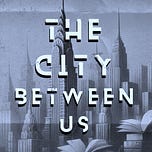

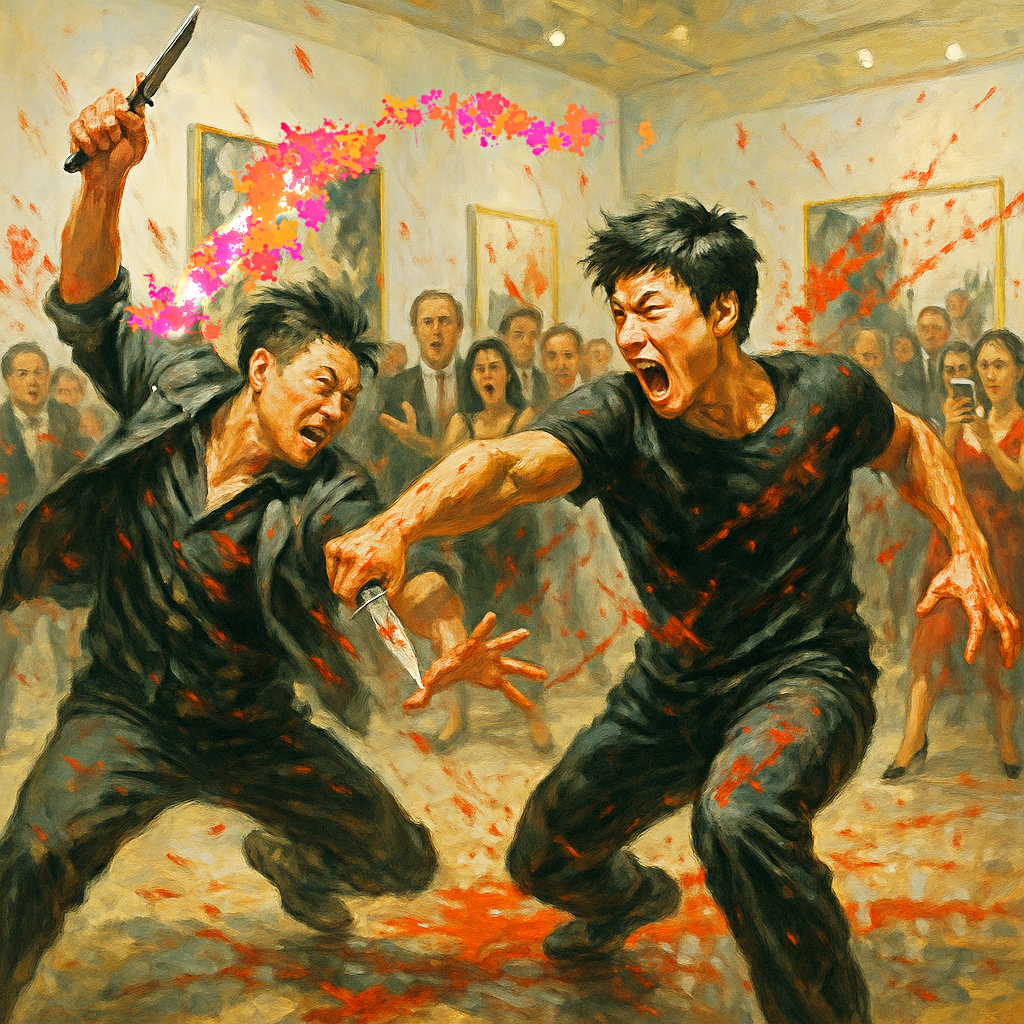




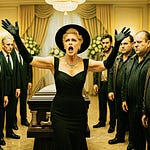

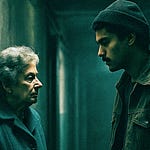
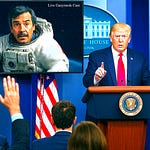




Share this post